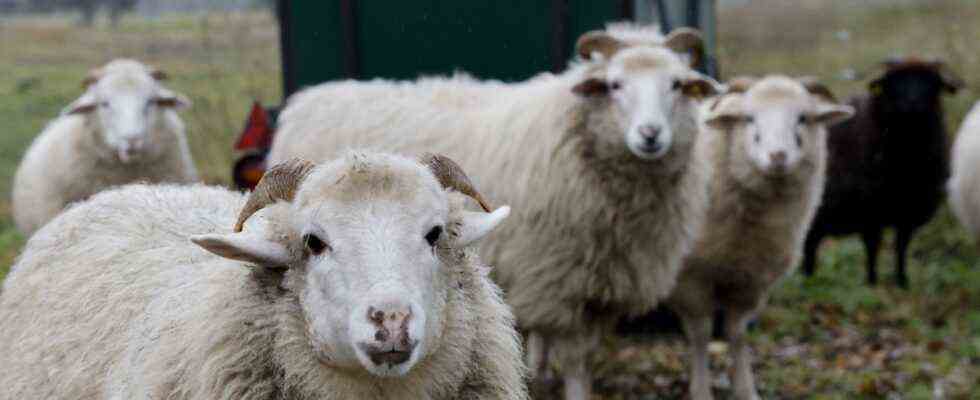As soon as Franziska Müller-Waldeck has pushed aside the steel grating that serves as a barrier, the sheep come trotting up. Above all Milli, the pack leader, who greets the visitor with curiosity. She has a particularly close relationship with Milli, says Müller-Waldeck and gives her the required crawling unit, which she acknowledges with a gentle smack. “Milli is part of the family. She is our princess.” Milli is one of the herd of endangered forest sheep that the 44-year-old owns, she was bottle-raised at her home.
Müller-Waldeck has had a small flock of sheep for eleven years, some of the animals live on a leased plot of land in Vötting. Most of the sheep have gathered there under the pasture tent on this gray and foggy November day. The other part of the animals graze on grassland at the Schafhof in Freising.
Whenever her time allows, Franziska Müller-Waldeck is with her sheep.
(Photo: Marco Einfeldt)
Franziska Müller-Waldeck actually has a doctorate in agricultural engineering, she works in the agricultural administration – her subject is, among other things, wildlife habitat advice, she advises farmers on how a greater biodiversity is possible in the open cultural landscape. This is her main job. The Lüdenscheid-born is also a passionate sheep farmer and has already launched many different nature projects with “Erdkind”.
Erdkind’s history goes back a long way – the project was developed together with their oldest child. At that time, Müller-Waldeck was still living in Kiel and studying agriculture. Her daughter was – just like she used to be – an outside child, and in our free time we were out and about in nature a lot. This is how the idea for Erdkind came about, the project was officially founded in 2006, when her daughter drew the logo. “The name Erdkind is intended to express our connection with the ground, the earth,” says Müller-Waldeck. It started very small, with children’s birthdays or excursions where herbs were collected together with the children and then distilled. Those were the first stories back then, she says.
The small family eventually moved to Freising, where Müller-Waldeck did her doctorate at the Technical University of Munich. In addition, Erdkind continued to grow. She wants to pass on her love for nature, her appreciation for it and her knowledge of natural relationships through Erdkind. “Discovering nature with all your senses and learning in the process – for example, how important sustainability is, that is the goal,” she explains. Responsible behavior should also be learned with a view to future generations.
Sheep care also includes a walk, which the animals also enjoy. The coat she wears was made from sheep’s wool in traditional Bavarian craftsmanship.
(Photo: Marco Einfeldt)
For a while, Müller-Waldeck then worked as a childminder, that was a good four years ago when her second child was born – and ended with the beginning of the Corona crisis in 2020. However, she still offers a small children’s program on some weekends today, which is also possible it’s about being outside. Earthworms or bees are observed or, as was the case last, hedges are explored, depending on the time of year. “The children should be enthusiastic about nature and hopefully become future conservationists.”
The desire for her own, regional, sustainable and people-oriented agriculture grew with her. In 2014 the time had come: Müller-Waldeck founded a small agricultural business, the decisive question at the time was whether she wanted to keep goats or sheep, she explains. During her many internships during her studies, she experienced the greatest moments of happiness in the sheep or goat shed. She then decided in favor of the sheep, “that was for rational reasons and out of love for these animals,” says Müller-Waldeck.
The sheep is the little man’s cow, that’s what they always said during her studies, she says and laughs. The oldest farm animal is easy to handle, easy to handle and relatively uncomplicated to keep. “And it has good properties for grazing. The forest sheep belong to the dying breeds of livestock, which was also a criterion for them.” They are very robust, frugal and their meat tastes fantastic. “The animals live with them all year round Open stables on orchards, some of which are certified organic, eat grass and, in winter, local hay and grain. Their sheep provide their meat, hides and wool – and are good for them. “Since Corona I would prefer to come to my sheep every day. Working with them is incredibly beneficial. “
Erdkind has evolved over the years, and now you can buy furs, clothes, carpets and creams – all products made from regional sheep. Müller-Waldeck markets them directly. The meat of the sheep is bought by a local butcher, among others. Slaughtering the animals is not easy for her, she openly admits. “But that’s just part of it.”
But she has not given up on her dream of her own field, which she has always had. “To be able to acquire my own land in the district, to have something of our own as a basis for Erdkind together with my family, would be my great wish. An agriculture that could be touched would be my absolute dream,” says Franziska Müller-Waldeck.

